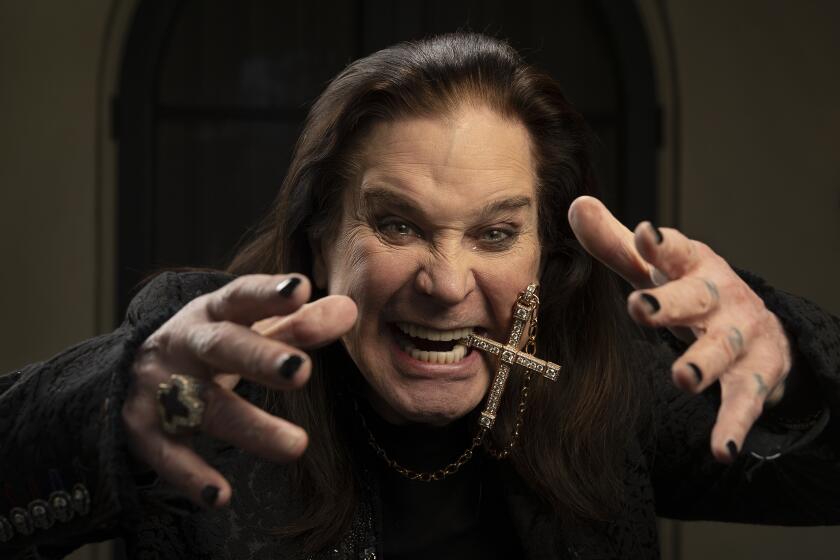Actors turn odd traits into the endearing
- Share via
In the hierarchy of television, being a freak and a geek is a good thing.
And the five actors who gathered to talk to The Envelope about their characters’ kooky idiosyncrasies (germophobia, social awkwardness, selfishness and then there’s the shape-shifting and murdering) — and the effect of their shows on the fanboy (and girl) audience — are at the upper echelon of the TV pecking order, some might say.
Following are edited excerpts from our chat — moderated by Times television critic Robert Lloyd — with Johnny Galecki (“Big Bang Theory”), Michael C. Hall (“Dexter”), Jayma Mays (“Glee”), Joel McHale (“Community”) and Sam Trammell (“True Blood”). To see video clips, go to TheEnvelope.com.
When you’re playing a character who is so different … how do you work on that and keep it from being unpalatable and turning it into a fan favorite instead?
Galecki: I don’t necessarily subscribe to making him likable or endearing in any way. I never thought about myself as a comedic actor. That’s the writers. If the writing is funny, you just play the honesty of it.
Hall: The show is structured in such a way, I think audiences enjoy it because they’re given permission to identify with someone who’s doing these things. Yeah, I don’t want him to be grumpy or poking people in the eye or anything — he’s got to be an affable guy, but, ultimately, it’s built in. He’s killing reprehensible people, and he does adhere to a code of ethics. I think people are inherently inclined to root for someone like that, especially if it’s subjective. I knew going in he should be someone who cultivated a persona or a way to interact with the world that’s kind of maybe breezy.
Do any of you do basic research, like did you go to CalTech, did you study people with OCD or did you turn into a … dog.
Trammell: Yeah, I did. No, I actually did go on Wikipedia and looked up the myth of the shape-shifter. There was so much stuff out there that was contradictory, and I sort of had to make up my own thing on that one. For me, I kind of play it as just the guy because when I turn into an animal … they just stick an animal in there and the animal does a great job on its own. Half of my job is done for me every time. Sometimes I’m offended by the animals they choose to turn me into.
Hall: I wouldn’t bark like that.
McHale: The accent is all wrong.
Do you have hopes for your characters? Given that a lot of them started out with a social deficit, are you hoping that they improve?
McHale: At least on “Community,” all the characters have some sort of thing going on, and Dan Harmon, the brilliant creator, never allows … I mean, if they fix something, something else pops up. Like when Britta was finally in an OK relationship, [the guy] turned out to be a Balkan war criminal and burned villages. My character was getting together with 18-year-olds, but it was going well, so …. Dan always wants to reflect real life. At least with my character, he’s enormously selfish, and to undo that would take a very long time, so, hopefully, we’ll go for, like, 30 years.
Mays: [Emma] has started taking medication for her [OCD], which will be interesting to see where they take her. It is hard because right now I love playing to her anxieties. There is something interesting about playing a character that has all these flaws. If it’s funny, it’s kind of a byproduct of that. I have no idea where they’re going to take her. They’re way more clever than I am.
Hall: I think if you’re going to play a character for a long time and there’s some sort of inherent conflict, if you’re liberated from that, the character becomes kind of uninteresting. You want him to move forward, but you’re kind of bound by that initial issue.
Galecki: Chuck Lorre, from Day One, had said that these guys would evolve at a snail’s pace. It’s often two steps forward and three, four, nine steps back, as far as their maturing. But then — especially for my character this year with having his heart shattered — when something like that happens, it changes you. There’s some license once in a while to take a few steps forward because if you don’t that’s just not realistic, to be the same person. When you go through something like that, it forces a certain growth, whether you want it or not.
More to Read
The biggest entertainment stories
Get our big stories about Hollywood, film, television, music, arts, culture and more right in your inbox as soon as they publish.
You may occasionally receive promotional content from the Los Angeles Times.











